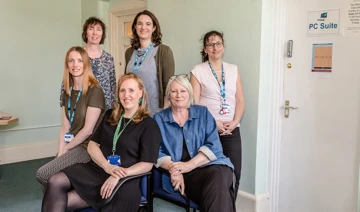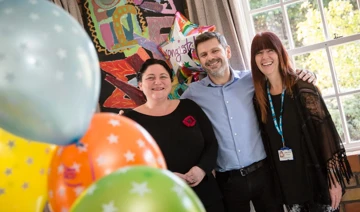Ross’ campaign to raise awareness of Encephalitis
Date added: 18 February 2021
Six years ago, Ross Buggins, Software Development Manager, was badly affected by Encephalitis. Encephalitis is inflammation of the brain, which affects 500,000 people globally each year. Ross had a long period before his final diagnosis and there are still many people who don’t fully understand Encephalitis symptoms.
Since his diagnosis of Anti-NMDA receptor encephalitis, he and his family have been campaigning to raise awareness of the crippling condition alongside the charity The Encephalitis Society. The best account of the situation Ross was experiencing comes from his mum, who has written a blog detailing what it was from her perspective and notes she had written during her son’s illness. Her blog does not include all the experiences that Ross’ dad, sister, younger brother and all of his friends went through and witnessed. They each have their own story; however it was the knowledge and love for Ross that kept them all going and to get the best possible care for him.
Ross’s symptoms started as sickness and a rash, followed by depression and anxiety that developed into psychosis over a period of four months. Clinicians battled the mental health symptoms, and for his own safety he was then sectioned for three months under the Mental Health Act. Only when he fell into comotisis, and then at the request of a sleep specialist consultant, was he transferred to a neurology ward; and finally diagnosed and treated for encephalitis.
The condition, like in Ross’ case, is often misdiagnosed and mimics other illnesses. Infectious encephalitis frequently begins with a ‘flu-like illness or headache. Typically more serious symptoms follow hours to days later. The most serious finding is an alteration in level of consciousness. This can range from mild confusion or drowsiness, to loss of consciousness, seizures and coma.
Other symptoms include a high temperature, seizures (fits), aversion to bright lights, inability to speak or control movement, sensory changes, neck stiffness, or uncharacteristic behaviour.
In autoimmune types of encephalitis people can present with psychosis and hallucinations among other neurological presentations. Sometimes these patients can be mistakenly thought to be developing psychiatric or mental health illnesses.
Those who survive encephalitis are often left with an acquired brain injury, the consequence of which means a return to work or education can be difficult. It can affect abilities such as concentration, attention, thinking, memory, judgement and inhibition, while leaving a legacy of additional challenges such as epilepsy or fatigue.
Ross’ sister Holly Buggins-Eaves has asked some of Kent’s landmarks to support World Encephalitis Day (WED). These include, Canterbury’s Westgate Towers, Herne Bay Clock Tower and Rochester Cathedral, which will all turn red on the evening of Monday 22 February to help “shine a light” on the devastating brain condition to help raise awareness.
Supporters of World Encephalitis Day are also being asked to wear red on February 22 and share pictures of themselves on social media using the hashtag, #RED4WED.
The Encephalitis Society was founded in 1994 and is a registered charity. It is the only resource of its kind in the world providing direct support and information to people affected by encephalitis, and to their family and friends. The Encephalitis Society receives no Government funding and relies on income raised from individuals, businesses and grant-making organisations.
For more information, visit www.worldencephalitisday.org



